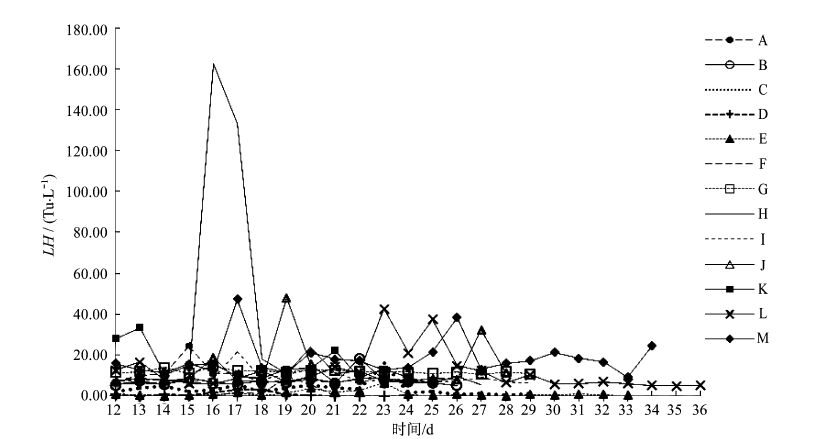The Effect of Carbohydrate Supplementation on the Reproductive Hormone and Energy Expenditure in Female Athletes with EAMD
-
摘要:目的 在不干扰女运动员正常训练的情况下,探讨单纯补糖对运动性月经周期紊乱(EAMD)运动员生殖激素及能量代谢的影响。方法 将受试者随机分为补糖组与对照组,补糖组进行连续3个月经周期的补糖干预。实验前后均测量全部受试者的身体成分、能量状况及黄体生成素(LH)、雌二醇(E2)和孕酮(P)水平。结果 实验后补糖组能量平衡由负转正,对照组无明显变化;实验后补糖组卵泡期E2、黄体期P水平上升,与对照组有显著性差异,且黄体期P水平与受试者能量状况呈正相关;实验后补糖组卵泡期和黄体期LH、黄体期E2、卵泡期P与对照组无显著性差异;补糖组、对照组在实验前后的相关生殖激素经组内比较均无显著性变化。结论 单纯补糖干预对EAMD运动员能量负平衡状况和相关生殖激素均有一定改善。Abstract: This study aims to discuss how carbohydrate supplementation affects the energy expenditure and reproductive hormone in female athletes with Exercise-Associated Menstrual Disorders(EAMD)without disturbing their regular training. Methods:Participants were randomly assigned into experimental carbohydrate group and control group. The experimental group was given carbohydrate intervention for 3 consecutive months. Body composition, energy expenditure and LH, E2, P were measured in both pre- and post-study for all participants.Results:The experimental group achieved positive energy balance after 3-month intervention, removing its negative energy balance in pre-intervention. No significant difference, however, was found within the control group. The release of E2 and P elevated in follicular phase and luteal phase respectively after the carbohydrate intervention, different from control group significantly; and that of P in luteal phase is positively correlated with energy expenditure. Moreover, no significant difference was observed in the relase of LH and P in follicular phase and that of LH and E2 in luteal phase between the two groups after the study, and the reproductive hormone in both groups stayed relatively stable before and after the study. Conclusion:Carbohydrate supplementation ameliorates the situation of negative energy balance and the release of related reproductive hormone in female athletes with EAMD, which has implications for the prevention and treatment of EAMD in female athletes.
-
女运动员作为竞技体育中不可或缺的一部分,长期的高负荷训练与紧张的比赛会影响其身体健康[1]。其中,最常见的医学问题为运动性月经周期紊乱(EAMD)。研究结果显示,从事不同体育项目的女运动员发生EAMD的概率为0%~60%不等[2]。EAMD是由运动导致的月经周期失调,闭经、月经稀疏、无排卵月经周期和黄体期短缺等是其常见的临床表现。目前认为,EAMD的发生与能量平衡(EB)关系密切,而可利用能量(EA)更是直接影响下丘脑-垂体-卵巢轴(HPO)的正常功能[3-4]。可利用能量是指机体能量摄入与运动能量消耗之间的差值,其与大负荷运动训练下的进食状况有关,是造成EAMD的关键因素[5-6]。当机体长期能量摄入不足时,可利用能量缺乏,在致使EAMD的同时,还引起内分泌失调进而使机体骨组织的代谢失衡并可能增加动脉粥样硬化[7-8]。因此,采取适当的方法减少EAMD对女运动员健康的危害有重要意义。
现今药物治疗为EAMD的主要治疗方法,但其不利于女运动员的身体健康。并且,由于女运动员这一职业的特殊性,在选择药物治疗方法时应考虑运动训练、受试者意愿等因素。基于此,在可利用能量假说指导下,饮食干预EAMD的研究开始被关注,但至今国内外相关研究尚少,尤其人体实验相关研究更少。因此,本文立足可利用能量假说,在不干扰女子运动员正常训练的情况下,采用补糖干预EAMD的方法,拟探讨补糖对改善EAMD的效果,为EAMD的防治提供参考。
1. 研究对象与方法
1.1 研究对象
16名受试者均为专业女运动员,来自上海体育学院附属竞技体育学校(散打队8名,中长跑队8名),年龄为17~21岁,运动等级一级水平以上,运动训练年限3年及以上,专项训练年限2年及以上,并有3年及以上行经史。
1.2 研究方法
1.2.1 筛选受试者
对上海体育学院附属竞技体育学校中长跑与散打队女运动员发放月经周期调查问卷[9](n=52)。筛选出自述月经周期紊乱的运动员,并对初选者进行1个月经周期的尿检(检测尿中黄体生成素)和血检(检测雌、孕激素)以确定月经周期情况,最终确定受试者16名,并随机分为补糖组和对照组。
受试者纳入标准:①患有EAMD的女运动员;②行经史≥3年;③运动等级均在一级运动员以上;④无高泌乳素血症、甲状腺功能紊乱等疾病;⑤近1个月未服用激素类药物。脱落标准:受试者在实验期间依从性差、连续2周外出比赛或训练脱落干预实验等。所有受试者均对本实验相关内容及流程了解,并自愿签署知情同意书。本实验设计通过上海市营养学会医学伦理委员会的鉴定并接受其监督(上海市营养学会医学伦理委员会[伦审]2013-002)。
1.2.2 测量身体成分
实验前后测量受试者身高、体重(身高体重测量仪,日本TANITA公司产)及体脂率(双能X线骨密度仪,美国GE公司产),以观察分析受试者身体成分的变化。
1.2.3 能量平衡状况测定
1.2.3.1 能量消耗
通过佩戴能量监控表(Sensewear Armband,美国Bodymedia公司产)记录受试者连续5 d的每日能量消耗(监控的日期包含1个休息日和4个训练日),并将采集的信息输入SenseWear Professional 8.0软件,分析受试者能量消耗情况。
1.2.3.2 膳食调查
在能量消耗监控期间,受试者每日3餐饮食摄入情况采用称重法测量,3餐外所食零食采用记账法记录。利用自动配餐王7.0软件对已进行食物生熟比转换后的数据分析受试者的饮食情况。
1.2.4 补糖干预的方法
根据补糖组受试者个体能量平衡状况,对其进行连续3个月经周期的个体化补糖干预(能量负平衡的数值即为补糖量)。干预在第1次月经周期的第3 d(卵泡早期)开始进行,至第3次月经周期的黄体中期,连续补糖3个月经周期。受试者饮用糖饮料的时间为周一~周六的每次训练期间。所选用的干预物质为低聚糖固体饮料(产品执行标准:GB 7101-2003,食品生产许可证编号:QS311406010048,上海利统生化制品有限公司产)。研究者将饮料(75 g/袋)按说明及每人需要的补充量(表 1)冲调后送至运动员训练地,督促运动员饮用。
表 1 补糖组补糖量(n=7)Table 1. Supplement amount of carbohydrate in experimental group(n=7)受试者 A B C D E F G 补糖量/g 89 11 229 238 102 22 301 1.2.5 样本采集与检测
1.2.5.1 尿检
补糖干预实验前,收集受试者1个月经周期的晨尿(早上起床后第1次中段尿,3 mL),收集时间为月经周期第12 d至下次月经来潮期间。为避免批内检测误差,待所有受试者晨尿收集完毕后统一进行检测,故每次收集的尿样置-80℃保存。使用放射免疫分析法(RIA)测量尿中黄体生成素(luteinizing hormone,LH),试剂盒由第二军医大学神经生物学教研室提供。
1.2.5.2 血检
在补糖实验前1个月经周期以及补糖实验期间的第3个月经周期的各月经周期的第(11±1)d(卵泡晚期)和第(22±1)d(黄体中期)采血。在清晨受试者空腹安静状态下由专业护士自前臂肘正中静脉抽取8 mL血分别置于2支促凝管中,每管各4 mL。待血样静置30 min后,将其中一支促凝管常温离心(2 500 r/min×20 min),取血清1 mL于EP管中,保存于-80℃冰箱。样本收集完毕后,采用免疫化学发光法(CLIA)检测雌二醇(Estradiol,E2)和孕酮(Progesterone,P),试剂盒购自Beckman Coulter 公司。另一支促凝管在低温(4℃)离心(2 500 r/min×20 min)后,取血清600 μL于EP管中,同样保存于-80℃冰箱,样本收集完毕后采用RIA检测LH,试剂盒由第二军医大学神经生物学教研室提供。
1.3 统计方法
使用SPSS 18.0软件整理数据并进行分析。所有方差齐性计量数据用平均值±标准差表示。实验前后2组间的能量平衡状况及血液指标使用独立样本t检验。实验前后组内血液指标及能量平衡状况采用配对样本t检验。指标间的相关性检验采用Pearson分析,P<0.05为差异具有统计学意义。
2. 研究结果
2.1 受试者基本情况
16名受试者中有14人完成整个实验,2名受试者(对照组1名,补糖组1名)因比赛、退队未完成实验。表 2显示,实验前后补糖组与对照组之间的各项基本指标经统计均无显著性差异。
表 2 受试者基本情况Table 2. Basic information of subjects类别 对照组(n=7) 补糖组(n=7) 实验前 实验后 实验前 实验后 身高/cm 166.0±3.6 166.5±3.7 166.2±5.4 166.6±5.6 体重/kg 58.1±9.2 58.7±9.8 55.5±8.0 55.8±8.2 体脂率/% 20.4±4.2 20.8±3.9 20.3±6.1 20.3±5.3 BMI/(kg·m-2) 21.0±2.6 21.1±2.7 20.1±2.7 20.1±2.6 年龄/岁 17.6±1.3 — 18.0±1.3 — 初训年龄/岁 13.3±2.4 — 11.7±3.2 — 训练年限/a 3.61±2.3 — 3.4±3.0 — 初潮时间/岁 13.6±1.3 — 13.4±1.5 — 2.2 晨尿LH水平的周期变化
因14名受试者中有1名运动员闭经,故未收集其晨尿。由图 1可知,5名受试者有排卵期LH峰值,但其中4名(A、H、J、K)为黄体期短缺(Lacteal Phase Defects,LPD),1名(M)黄体期血清孕酮值低落。其余8名(B、C、D、E、F、G、I、L)无LH峰值为无排卵月经周期。
2.3 月经周期的状况
如表 3所示,14名受试者中1名闭经,其余受试者均有月经来潮。受试者发生痛经的比例较高,且经期普遍坚持训练。
表 3 受试者月经周期的状况Table 3. Menstrual cycle of subjects类别 对照组(n=7) 补糖组(n=7) 总体 人数 比例/% 人数 比例/% 人数 比例/% 月经周期/d 21~28 3 42.8 1 14.3 4 28.6 28~38 2 28.6 1 14.3 3 21.4 不规律 2 28.6 5 71.4 7 50.0 是否痛经 经常 2 33.3 3 42.9 5 38.4 偶尔 2 33.3 4 57.1 6 46.2 否 2 33.3 0 0 2 15.4 经期训练情况 全休 1 14.3 0 0 1 7.1 见习 0 0 0 0 0 0 轻微活动 0 0 0 0 0 0 减量训练 2 28.6 4 57.1 6 42.9 照常训练 4 57.1 3 42.9 7 50.0 2.4 能量状况的变化
2.4.1 实验前后三大营养素摄入情况
从表 4可见,实验后补糖组碳水化合物摄入量增加较多,达到推荐量,但实验前后补糖组与对照组受试者三大营养物质摄入情况经统计差异不具有统计学意义(P>0.05)。
表 4 实验前后受试者三大营养素摄入情况Table 4. Nutrients intake of subjects before and after intervention营养物质 时间 补糖组(n=7) 对照组(n=7) 推荐量 碳水化合物/g 实验前 516.1±354.9 348.5±91.0 577.5~ 实验后 634.4±297.5 398.9±99.8 682.5 蛋白质/g 实验前 138.1±104.6 126.1±86.7 126.0~ 实验后 139.2±104.2 106.8±41.1 157.5 脂肪/g 实验前 97.4±65.3 88.5±52.5 116.7~ 实验后 113.2±60.0 77.5±27.3 140.0 2.4.2 实验前后能量变化情况
表 5显示,实验后补糖组能量平衡由负转正,较对照组有显著性差异(P=0.029)。补糖组实验前后能量平衡差异有统计学意义(P=0.019)。
表 5 实验前后受试者能量状况的变化Table 5. Energy status of subjects before and after intervention组别 实验前 实验后 (n=7) 能量摄入/kJ 补糖组 9 750.7±1 279.9 11 446.1±877.7 对照组 9 108.3±1 749.3 9 831.2±2 679.8 能量消耗/kJ 补糖组 11 713.5±619.0 10 891.4±824.3 对照组 10 973.6±688.9 10 620.3±2 234.9 能量平衡/kJ 补糖组 -1 962.8±1 536.6 554.8±451.0*# 对照组 -1 865.3±1 276.0 -789.1±822.8 注:*表示与实验后对照组比较,P<0.05;#表示与实验前补糖组比较,P<0.05 2.5 LH、E2和P的变化情况
表 6显示,实验后卵泡期LH值、黄体期LH值的组间组内差异均无统计学意义(P>0.05)。实验后卵泡期E2补糖组和对照组有显著差异(P=0.026),黄体期E2两组间差异无统计学意义(P>0.05)。实验后黄体期P两组间有显著差异(P=0.017),卵泡期P两组间差异无统计学意义(P>0.05)。
表 6 实验前后LH、E2和P的变化Table 6. LH,E2 and P level before and after intervention采血期 组别 实验前 实验后 (n=7) LH/
(mIu·mL-1)卵泡期 补糖组 12.6±4.5 11.6±2.1 对照组 14.7±4.9 13.1±2.6 黄体期 补糖组 14.4±6.7 12.3±5.5 对照组 17.0±5.8 17.08.6±8.6 E2/
(ng·L-1)卵泡期 补糖组 52.4±6.5 88.5±41.1* 对照组 42.1±8.2 36.7±9.7 黄体期 补糖组 134.4±81.7 107.9±48.2 对照组 107.4±81.0 98.4±64.2 P/
(μg·L-1)卵泡期 补糖组 0.9±0.2 1.0±0.3 对照组 1.0±0.3 1.1±0.3 黄体期 补糖组 6.7±7.2 7.7±5.1* 对照组 2.0±2.3 2.0±1.9 2.6 实验后补糖组能量状况与E2、P的相关性
如表 7所示,补糖干预后补糖组能量状况与E2水平无相关性(P>0.05),但与P水平呈高度正相关(P<0.05)。
表 7 实验后补糖组E2、P与能量状况的相关性(n=7)Table 7. Correlation of experimental group between energy and E2,P levels after intervention(n=7)指标 R2 P E2 0.348 0.410 P 0.980 0.006 3. 分析与讨论
3.1 受试者月经周期情况
本实验采用主观问卷结合客观检测的方法,最终确定14名受试者为EAMD。月经周期不规律包括周期小于21 d或大于38 d以及闭经。本实验中主观问卷显示,月经周期不规律者比例达50%。有学者在分析优秀女子摔跤运动员的月经周期后指出,这一比例可高达61.5%[10]。本研究尿检结果显示,14名受试者均为EAMD,由此可见规律的月经周期天数并不代表受试者有正常月经周期。一些有明显症状的月经周期紊乱,如月经稀疏与闭经可因月经周期延长或月经停止等现象察觉,但无排卵月经周期和LPD由于无明显症状而不易被发现,故仅使用主观月经周期调查问卷不能准确地反映受试者月经周期紊乱的状况。本研究在主观问卷的基础之上,增加了对受试者月经周期情况的客观检测,结果显示受试者大多为无排卵月经周期(8/14),其次为LPD(4/14)。无排卵月经周期和LPD是EAMD中较轻的2种形式[11],在女子运动员中的发生率较高,Vescovi[12]指出两者的发生率可分别达到29%和48%。本研究中受试者大多处于较轻形式的EAMD,可能与受试者训练年限或暴露于能量负平衡的时间有关。
月经周期问卷调查结果显示,2/3的受试者存在痛经情况,且50%的受试者在经期保持日常训练负荷量。相关研究[13-14]认为,适中的体育运动能减轻痛经的症状,但长期运动过量尤其剧烈运动会增大子宫内压而加重痛经。本实验的受试者均为专业运动员,长期处于高负荷的运动训练之下,痛经情况普遍。
3.2 补糖干预对能量平衡和身体成分的影响
在实验前受试者三大营养素的摄入中,两组受试者碳水化合物和脂肪的摄入均未达到运动员的膳食推荐量,可见运动员的膳食摄入量处于不足的状态。与本研究调查结果相似,Bernad[15]通过分析近10篇相关文献,发现70%的运动员能量摄入不足,而碳水化合物摄入不足的运动员比例达90%。林媛[16]以体操运动员为研究对象,经膳食分析也发现运动员膳食摄入不足,其中女子运动员三大营养素的摄入均低于推荐量。本研究通过补糖增加了受试者碳水化合物摄入量并达到推荐值,因此提高了其能量摄入水平,为改善能量负平衡提供了帮助。
本实验前所有受试者均处于能量负平衡状态,对照组能量负平衡为(-1 865.3±1 276.0)kJ,补糖组达(-1 962.8±1 536.6)kJ,这一现象可能与受试者所从事的运动项目有关。由于运动项目特征,两队均涉及体重因素。散打是分体重级别的运动,赛前散打运动员会严格控制体重以进入较轻级别的比赛,靠体重或力量优势而提升获胜率[17]。中长跑是速度与耐力性运动,由于项目训练特点运动员身体形态一般较瘦,其体脂率和体内水分比例明显低于短跑、排球等运动员[18]。根据两运动项目特征与运动员长期的高负荷训练可知,能量负平衡并不是个别现象。Mountjoy等[19-20]也指出,能量缺乏是女子运动员的常见状态。
本实验后补糖组能量平衡状况好转为正平衡(554.8±451.0)kJ,与实验前差异显著,对照组则依旧处于能量负平衡状态。由此可见,补糖干预能较好地逆转女子运动员能量负平衡状态。国外相关研究也按照饮食摄入量推荐指南或运动营养饮料对受试者能量摄入进行干预,改善了受试者的能量状况[21-22]。
此外,实验后受试者体重、体脂率和BMI水平较干预前无差异,表明本研究受试者补充低聚糖固体饮料不会引起脂肪堆积,也不会对有体重限制运动项目的运动员产生不良影响。
3.3 补糖干预对LH值的影响
LH受下丘脑GnRH调控并由垂体分泌产生,其不仅是促使成熟卵泡排卵的关键生殖激素,还对排卵后黄体的形成与发育产生重要影响。本实验后,补糖组血LH值组间、组内比较均无显著性差异,说明补糖对LH值尚未见改善效果,这与一些研究结果相似。赵璨[23]与刘晓莉[24]的动物研究中,LH值分泌水平在补糖干预下与对照组相比无明显上升。人体实验中Cialdella-kam等[22]同样发现6个月的能量补充未对LH值有显著影响。也有研究发现相反结果,Loucks等早期研究指出,能量摄入的增加能够促进LH的正常脉冲分泌,值得注意的是该研究中的受试者处于短期的低可利用能量状态,那么能量摄入的增加对长期处于低可利用能量状态的受试者LH值是否有积极影响还有待探讨。此外,另一研究对受试者三餐进行全面干预以达到膳食营养推荐摄入量,干预后发现受试者血LH值较干预前有显著性差异,但该研究与本研究干预方法不同,这或许是对血LH值有不同干预效果的原因[21]。
LH除受GnRH调控,还受E2、P的负反馈影响。本研究LH水平无显著性变化可能因卵泡期E2、黄体期P水平明显增加而受其负反馈抑制有关。除此之外,LH水平无改变可能还与β-内啡肽(β-endorphin)相关。β-内啡肽是机体在运动过程中的产物,其对LH的分泌有抑制作用,该作用仅在卵泡晚期和黄体中期(本实验采血就是这2个时期),通过抑制去甲肾上腺素(Norepinephrine,NE)对促黄体生成素释放激素(luteinizing hormone-releasing hormone,LHRH)的分泌作用产生影响。那么,基于本研究受试者为运动员以及β-内啡肽与LH的关系,可推测这是引起LH水平无明显变化的原因之一。
3.4 补糖干预对E2、P水平的影响
E2是由卵巢分泌的一类类固醇激素,其分泌水平根据卵巢周期而变化,分泌高峰出现于排卵前期,对成熟卵泡排卵产生影响。P是由卵巢黄体分泌,其在月经周期的卵泡期分泌有限,在排卵后的黄体中期达到分泌高峰,对维持正常黄体功能产生重要作用。HPO轴(Hypothalamic-Pituitary-Ovarian axis,HPO)的正常运转离不开充足的能量供应,大多数研究已指出能量负平衡对因运动抑制的生殖功能产生重要影响。葡萄糖是大脑供能的唯一物质,当机体处于能量负平衡时,可利用能量不足,会对下丘脑-垂体-卵巢轴产生负面影响,抑制雌孕激素合成,进而影响正常月经周期。本实验后补糖组卵泡期E2和黄体期P水平上升较对照组差异显著,且干预后P水平与受试者能量状况存在高度正相关,表明能量摄入的增加对E2和P的分泌合成有良好恢复作用。Williams等在21世纪初就指出可利用能量不足会影响正常月经周期,其动物研究中E2在长期能量缺乏时下降,而在增加能量摄入后显著上升。Williams等[4]近期的研究则进一步证明E2、P与能量的密切关系。其研究发现,受试者尿中雌孕激素的代谢产物E1G(Estrone-1-glucuronide)和PdG(Pregnanediolglucuronide)水平在能量缺乏期间显著减少,并指出能量缺乏是雌激素分泌降低的强烈信号。此外,Vanheest通过对10名优秀青年游泳运动员进行12周的运动表现评估,发现E2、P水平较低的受试者能量摄入不足而处于运动表现下降的状态。以上研究均证明了能量缺乏会对E2、P产生负面影响。
本研究通过补糖干预也进一步证实能量充足对E2、P的正面影响。E2、P是类固醇激素,其分泌合成的前体为胆固醇。本研究中糖的补充为受试者增加了能量供应,缓解了能量负平衡状态,可使脂肪动员供能减少。由于脂肪可分解为脂肪酸,而脂肪酸的β-氧化亦可产生胆固醇的原料乙酰辅酶A(acetyl coenzyme A);因此,通过补糖而节约的部分脂肪供能可为E2、P提供合成原料,这可能是本研究E2、P水平上升的原因之一。另一原因可能是补糖使原本抑制的HPO轴因能量负平衡状况的改善而恢复功能。能量负平衡时,耗能较高的生殖系统因能量缺乏处于功能抑制状态,通过补糖增加能量供应后改善了机体能量负平衡状况,为HPO轴提供了更多能量,从而促使生殖系统恢复功能,使E2、P分泌水平上升。
本文补糖组黄体期E2和卵泡期P干预后与对照组相比效果不明显,可能由于E2在黄体期分泌水平较卵泡期上升缓慢,P在卵泡期分泌水平较黄体期上升缓慢,因此黄体期E2和卵泡期P水平经检测无明显上升;而补糖组、对照组的相关生殖激素在实验前后均无显著变化,可能与本研究补糖干预的时间较短有关。
综上所述,单纯补糖干预(不干涉受试者正常运动训练)对受试者身体能量状况和卵泡期E2、黄体期P水平均有所改善,但使用低聚糖进行能量补充的时间还有待于探讨。未来的相关研究可观察HPO轴的关联指标,以期为EAMD的防治提供更多的参考。
4. 结束语
补糖干预能明显提高受试者能量摄入,并改善其能量负平衡状况。补糖干预能改善月经周期紊乱受试者卵泡期E2、黄体期P的分泌水平,且黄体期P水平与受试者能量状况呈正相关。
-
表 1 补糖组补糖量(n=7)
Table 1 Supplement amount of carbohydrate in experimental group(n=7)
受试者 A B C D E F G 补糖量/g 89 11 229 238 102 22 301 表 2 受试者基本情况
Table 2 Basic information of subjects
类别 对照组(n=7) 补糖组(n=7) 实验前 实验后 实验前 实验后 身高/cm 166.0±3.6 166.5±3.7 166.2±5.4 166.6±5.6 体重/kg 58.1±9.2 58.7±9.8 55.5±8.0 55.8±8.2 体脂率/% 20.4±4.2 20.8±3.9 20.3±6.1 20.3±5.3 BMI/(kg·m-2) 21.0±2.6 21.1±2.7 20.1±2.7 20.1±2.6 年龄/岁 17.6±1.3 — 18.0±1.3 — 初训年龄/岁 13.3±2.4 — 11.7±3.2 — 训练年限/a 3.61±2.3 — 3.4±3.0 — 初潮时间/岁 13.6±1.3 — 13.4±1.5 — 表 3 受试者月经周期的状况
Table 3 Menstrual cycle of subjects
类别 对照组(n=7) 补糖组(n=7) 总体 人数 比例/% 人数 比例/% 人数 比例/% 月经周期/d 21~28 3 42.8 1 14.3 4 28.6 28~38 2 28.6 1 14.3 3 21.4 不规律 2 28.6 5 71.4 7 50.0 是否痛经 经常 2 33.3 3 42.9 5 38.4 偶尔 2 33.3 4 57.1 6 46.2 否 2 33.3 0 0 2 15.4 经期训练情况 全休 1 14.3 0 0 1 7.1 见习 0 0 0 0 0 0 轻微活动 0 0 0 0 0 0 减量训练 2 28.6 4 57.1 6 42.9 照常训练 4 57.1 3 42.9 7 50.0 表 4 实验前后受试者三大营养素摄入情况
Table 4 Nutrients intake of subjects before and after intervention
营养物质 时间 补糖组(n=7) 对照组(n=7) 推荐量 碳水化合物/g 实验前 516.1±354.9 348.5±91.0 577.5~ 实验后 634.4±297.5 398.9±99.8 682.5 蛋白质/g 实验前 138.1±104.6 126.1±86.7 126.0~ 实验后 139.2±104.2 106.8±41.1 157.5 脂肪/g 实验前 97.4±65.3 88.5±52.5 116.7~ 实验后 113.2±60.0 77.5±27.3 140.0 表 5 实验前后受试者能量状况的变化
Table 5 Energy status of subjects before and after intervention
组别 实验前 实验后 (n=7) 能量摄入/kJ 补糖组 9 750.7±1 279.9 11 446.1±877.7 对照组 9 108.3±1 749.3 9 831.2±2 679.8 能量消耗/kJ 补糖组 11 713.5±619.0 10 891.4±824.3 对照组 10 973.6±688.9 10 620.3±2 234.9 能量平衡/kJ 补糖组 -1 962.8±1 536.6 554.8±451.0*# 对照组 -1 865.3±1 276.0 -789.1±822.8 注:*表示与实验后对照组比较,P<0.05;#表示与实验前补糖组比较,P<0.05 表 6 实验前后LH、E2和P的变化
Table 6 LH,E2 and P level before and after intervention
采血期 组别 实验前 实验后 (n=7) LH/
(mIu·mL-1)卵泡期 补糖组 12.6±4.5 11.6±2.1 对照组 14.7±4.9 13.1±2.6 黄体期 补糖组 14.4±6.7 12.3±5.5 对照组 17.0±5.8 17.08.6±8.6 E2/
(ng·L-1)卵泡期 补糖组 52.4±6.5 88.5±41.1* 对照组 42.1±8.2 36.7±9.7 黄体期 补糖组 134.4±81.7 107.9±48.2 对照组 107.4±81.0 98.4±64.2 P/
(μg·L-1)卵泡期 补糖组 0.9±0.2 1.0±0.3 对照组 1.0±0.3 1.1±0.3 黄体期 补糖组 6.7±7.2 7.7±5.1* 对照组 2.0±2.3 2.0±1.9 表 7 实验后补糖组E2、P与能量状况的相关性(n=7)
Table 7 Correlation of experimental group between energy and E2,P levels after intervention(n=7)
指标 R2 P E2 0.348 0.410 P 0.980 0.006 -
[1] Matzkin E,Curry E J,Whitiock K.Female athlete triad:Past,present,and future[J].J Am Acad Orthop Surg,2015,23(7):424-423 doi: 10.5435/JAAOS-D-14-00168
[2] Gibbs J C,Mallinson R J,DeSouza M J.Prevalence of individual and combined components of the female athlete triad[J].Med Sci Sports Exerc,2013,45(5):985-996 doi: 10.1249/MSS.0b013e31827e1bdc
[3] Ristic N,Stevanovic D,Nesic D,et al.Diet-induced obesity and ghrelin effects on pituitary gonadotrophs:Immunohistomorphometric study in male rats[J].Cell J,2016,17(4):711-719 https://www.researchgate.net/profile/Dejan_Nesic/publication/306339885_Erratum_Diet-Induced_Obesity_and_Ghrelin_Effects_on_Pituitary_Gonadotrophs_Immunohistomorphometric_Study_in_Male_Rats/links/57b9a24c08ae6f1737684b96.pdf?origin=publication_list
[4] Williams N I,Reed J L,Leidy H J,et al.Estrogen and progesterone exposure is reduced in response to energy deficiency in women aged 25-40 years[J].Hum Reprod,2010,25:2328-2339 doi: 10.1093/humrep/deq172
[5] Nattiv A,LoucksA B,Manore M M,et al.American college of sports medicine position stand:The female athlete triad[J].Med Sci Sports Exerc,2007,39(10):1867-1882 doi: 10.1249/mss.0b013e318149f111
[6] 李擎,王人卫.可利用能量与运动性月经失调的关系[J].沈阳体育学院学报,2006,25(2):58-60 http://www.cnki.com.cn/Article/CJFDTOTAL-SYTB200602020.htm [7] Christo K,Prabhakaran R,Lamparello B,et al.Bone metabolism in adolescent athletes withamenorrhea,athletes with eumenorrhea and control subjects[J].Pediatrics,2008,121(6):1127-1136 doi: 10.1542/peds.2007-2392
[8] Rickenlund A,Eriksson M J,Schenck-Gustafsson K,et al.Amenorrhea in female athletes is associated with endothelial dysfunction and unfavorable lipid profile[J].J Clin Endocrinol Metab,2005,90(3):1354-1359 doi: 10.1210/jc.2004-1286
[9] 吴薇,张晓英,王人卫,等.运动对运动员月经周期影响的调查与分析[J].体育科研,2004,25(5):56-60 http://www.cnki.com.cn/Article/CJFDTOTAL-TYKA200405017.htm [10] 高行军,孙强.优秀中国式摔跤女子运动员月经状况调查与分析[J].安徽体育科技,2009,30(2):50-52 http://www.cnki.com.cn/Article/CJFDTOTAL-ATKJ200902017.htm [11] Reed J L,DeSouza M J,Mallinson R J,et al.Energy availability discriminates clinical menstrual status in exercising women[J].J Int Soc Sports Nutr,2015,12:11 doi: 10.1186/s12970-015-0072-0
[12] Vescovi J D.The menstrual cycle and anterior cruciate ligament injury risk:Implications of menstrual cycle variability[J].Sports Med,2011,41(2):91-101 doi: 10.2165/11538570-000000000-00000
[13] 尹航,尹恒,蒋川.运动对原发性痛经的影响[J].新乡医学院学报,2010,27(6):637-639 http://www.cnki.com.cn/Article/CJFDTOTAL-XXYX201006039.htm [14] Amanda Daley.The role of exercise in the treatment of menstrual disorders:The evidence[J].Br J Gen Pract,2009,59(561):241-242 doi: 10.3399/bjgp09X420301
[15] Bernad Asencio L,Reig Garcia-Galbis M.Ecergy and micronutrient intake in female athletes[J].Nutr Hosp,2015,32(5):1936-1948 https://www.researchgate.net/profile/Sophia_Papadopoulou2/publication/11376196_Macro-_and_Micro-nutrient_Intake_of_Adolescent_Greek_Female_Volleyball_Players/links/0fcfd50d4413b576f1000000.pdf
[16] 林媛,吕晓华,刘艳,等.四川省优秀体操运动员膳食状况调查[J].现代预防医学,2010,37(2):241-244 http://www.cnki.com.cn/Article/CJFDTOTAL-XDYF201002022.htm [17] 李晓慧.女子散打运动员赛前体重控制研究[J].武术科学,2014,11(1):69-71 http://www.cnki.com.cn/Article/CJFDTOTAL-WSKX201401028.htm [18] 马俊,张霈,杨丽然,等.不同项目运动员身体成分特征[J].北京体育大学学报,2011,34(6):125-127 http://www.cnki.com.cn/Article/CJFDTOTAL-BJTD201106035.htm [19] Mountjoy M,Sundgot-Borgen J,Burke L,et al.The IOC consensus statement:Beyond the female athlete triad-Relative energy deficiency in sport (RED-S)[J].Br J Sports Med,2014,48(7):491-497 doi: 10.1136/bjsports-2014-093502
[20] K.Łagowska,Kapczuk K,Jeszka J,et al.Decreased basic metabolic rate may reflect pituitary secretion disturbance in elite female athlete[J].Science & Sports,2014,29(5):258-265 https://www.researchgate.net/publication/266749683_Decreased_basic_metabolic_rate_may_reflect_pituitary_secretion_disturbance_in_elite_female_athlete
[21] K.Łagowska,Kapczuk K,Friebe Z,et al.Effects of dietary intervention in young female athletes with menstrual disorders[J].J Int Soc Sports Nutr,2014,11:21 doi: 10.1186/1550-2783-11-21
[22] Cialdella-Kam L,Guebels C P,Maddalozzo G F,et al.Dietary intervention restored menses in female athletes with exercise-associated menstrual dysfunction with limited impact on bone and muscle health[J].Nutrients,2014,6(8):3018-3039 doi: 10.3390/nu6083018
[23] 赵璨.补充两种糖对运动性动情周期抑制大鼠HPO轴功能与结构的影响[D].上海:上海体育学院,2013:44 [24] 刘晓丽.补充两种糖对大鼠运动性动情周期抑制的缓解和改善[D].上海:上海体育学院,2012:49 -
期刊类型引用(1)
1. 张亚芳. 人体成分与不孕女性患者生殖激素水平的相关性分析. 中国妇幼保健. 2019(15): 3536-3538 .  百度学术
百度学术
其他类型引用(0)




 下载:
下载:
